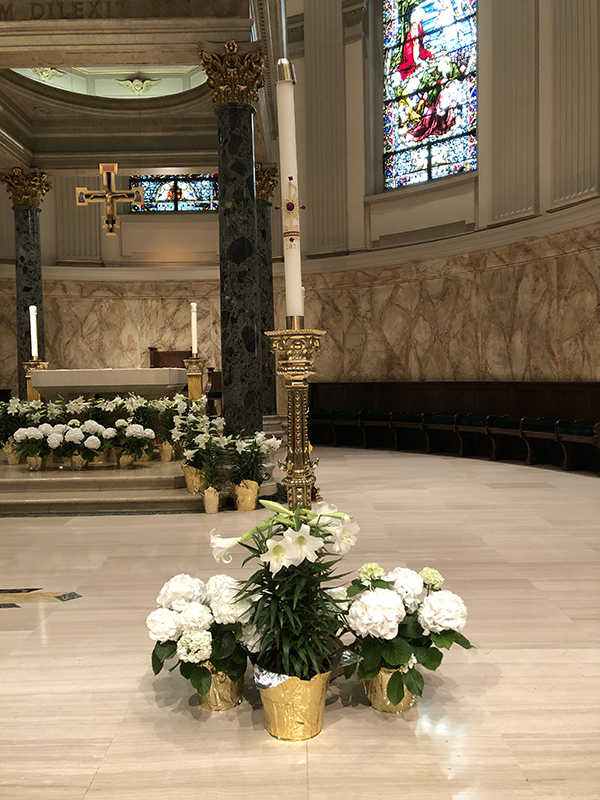WINDSOR TERRACE — Kids are finished scooping up all the eggs from their backyard egg hunts, people with a sweet tooth have consumed all of the chocolate they can eat, and women have put away their colorful bonnets.
But the Easter season isn’t over. Far from it.
Eastertide, or the Paschal Season as it is sometimes called, is the 50-day period that begins on Easter Sunday and lasts until Pentecost Sunday.
“For us, it is a time to rejoice. It is a time to remember the Resurrection and reflect on it,” said Auxiliary Bishop Witold Mroziewski.
“The joy and the mystery of Easter can’t be contained in a single day,” said Father Patrick Keating, vicar Financial Administration and econome for the Diocese of Brooklyn.
Parishioners will notice a few changes in church — for example, priests wear white vestments.
Each Sunday during this period is treated as a Sunday of Easter all the way up to the Seventh Sunday of Easter, after which comes Pentecost Sunday a week later. The Second Sunday of Easter is also the Divine Mercy Sunday.

The eight-day period starting from Easter Sunday and ending on Divine Mercy Sunday (counting both Sundays) is known as the Octave of Easter.
Ascension Thursday, the day Christians celebrate as the day Jesus Christ ascended into heaven, comes at the 40-day mark of Eastertide.
During the Eastertide, the first readings at Mass are taken from the Acts of the Apostles, a switch from other times of the year, when a passage from the Old Testament usually serves as the first reading.
“The readings are so powerful during this time,” Father Keating said, explaining that the readings show the struggles faced by the Apostles.
It’s important during the 50 days of Eastertide to reflect on the Apostles and how they spread the word about Jesus Christ being the savior of the world, said Msgr. David Cassato, pastor of St. Athanasius Parish in Bensonhurst.
“These 50 days is all about the message going out to all the world,” he said.
Italian-Americans take Eastertide seriously, according to Msgr. David Cassato.
The day after Easter is known as Easter Monday in Italy. “It’s called the Pasquetta. After the work of Easter, most people in Italy take the day off and they go to the country and celebrate all the leftovers — all the leftover food. It’s really a great day,” he said.
Easter Monday was always a big deal in Camille Orrichio Loccisano’s Dyker Heights home when she was growing up.
“A lot of Catholics think about the Resurrection of Jesus and think that’s it. It’s over. They don’t think about what comes after. But I grew up learning about Pentecost Sunday. And my mom always talked about Easter Monday,” she said. “I remember that my grandmother made a special dish called “minestra.” … It was a special dish she made that was earmarked for Easter Monday.”
For Polish-Americans, the Second Sunday of Easter is a special day, according to Bishop Mroziewski.
“It is a time to celebrate Divine Mercy Sunday. In many places, at 3 p.m., there are Divine Mercy devotions in the parishes,” he said. “There is a time for Polish people to pray as a family in their homes.”
Polish people have traditionally celebrated baptisms on the Second Sunday of Easter.
“In some parts of Ireland, there was a tradition of having boiled eggs. It was something special. You didn’t eat eggs every day,” Father Keating said.
Most of all, Eastertide is a time to renew one’s faith, according to Bishop Mroziewski.
“The church always invites all people of faith to celebrate,” he said. “The doors of the church are open to all. We are looking for people to return closer to the church.”
